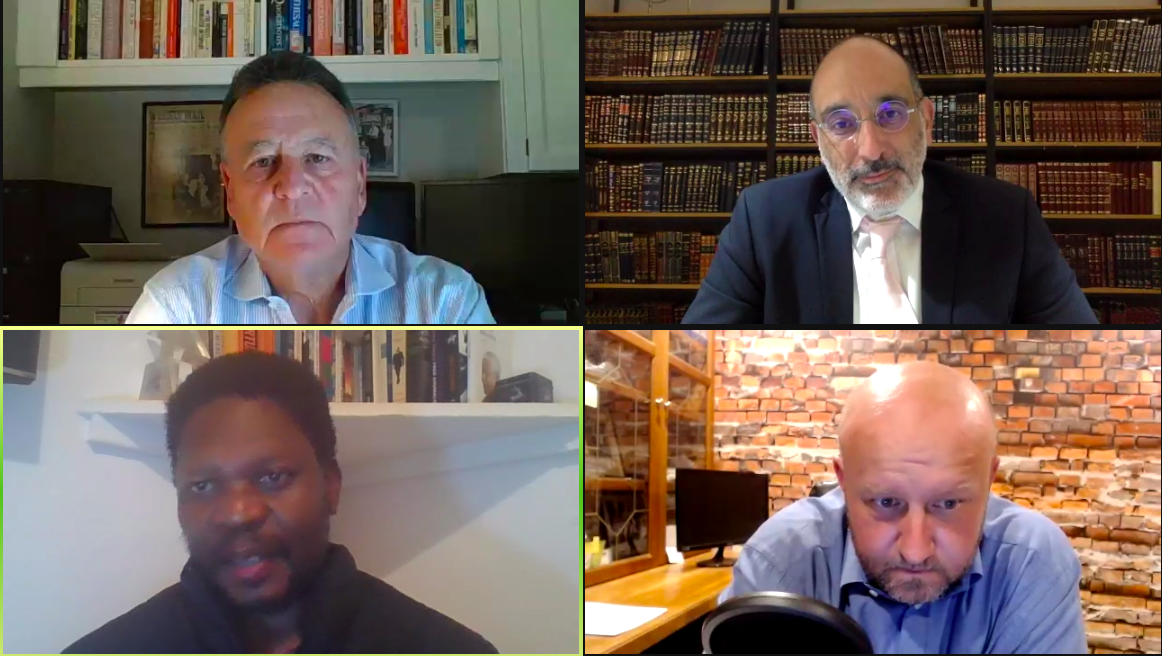click to dowload our latest edition
CLICK HERE TO SUBSCRIBE TO OUR NEWSLETTER


Published
2 years agoon
By
Mirah LangerThe recent election results offer hope of a new kind of unity in diversity, one in which South Africans work together in broad alliances to promote shared values, election analysts say.
“For the ANC to fall below 50% is a psychological and seismological watershed moment,” said former South African ambassador and former leader of the Democratic Alliance (DA), Tony Leon.
“This election has certainly given us the greatest number of takeaways and quite a few positives, coming from where I do,” he said.
Leon was speaking at an online seminar hosted by Chief Rabbi Dr Warren Goldstein this week.
Unpacking the election results were also Mondli Makhanya, City Press editor-in-chief, and Frans Cronje, the chief executive of the South African Institute of Race Relations.
This election was the first in which the ruling party, the African National Congress (ANC), fell below a 50% majority, getting 45.59% of the vote. In addition, voter turnout was markedly low, with only 45.87% of eligible South Africans showing up to mark their ballots.
Leon said that although South Africa “followed its own rhythm”, there was a historical precedent of liberation movements reaching an “expiry date” by which they eventually lost their emotional grip on the nation and consequent political monopoly.
Leon cited the example of the labour party in Israel as an example, to which Makhanya added the example of Zambia’s liberation party that eventually went “to the cemetery”.
“Liberation parties do run out of steam unless they take remarkably proactive action to maintain themselves,” said Leon. “Our country is in a lot of trouble, and I think voters have woken from a torpor and have said, ‘I no longer actively support the ruling party.’”
Makhanya said that the roots for what happened during these elections were laid in 2009, when the Congress of the People (COPE) first broke away from the ANC and contested the elections.
Prior to this, the opposition was associated with a lack of progressiveness and opposition to transformation, suggested Makhanya.
“When the COPE breakaway occurred, it made it possible to say that it was okay for traditional voters of the ANC to vote against the ANC, and that it wasn’t a betrayal of the liberation or one’s identity.
“Then again, in 2014, the Economic Freedom Fighters [EFF] also came from the ANC and told voters that it would take on the ANC. As such, by 2016, people were voting freely.”
Makhanya said that behind this month’s vote “was a lot of anger. People see the country going in the wrong direction.”
While some expressed their frustration by voting for other parties, the significant proportion of people who didn’t vote at all were also taking “an active decision”.
“They were saying [to the ANC] that we don’t trust you; we don’t believe the promises that you have made us. That’s a huge shift. The ANC now ceases to be the epicentre of everything South African.”
Now, the playing field is open “for a different party to make themselves a winning proposition”. However, at the moment, no opposition party seems able to build this support basis, suggested Makhanya.
In this absence, he cautioned against the mobilisation of voters along ethnic lines.
“Both the EFF and the DA seem to have reached a ceiling. The parties on stage right now aren’t speaking the language of South Africa.”
He noted, for example, the strides made by the Inkatha Freedom Party in KwaZulu-Natal and rhetoric shaping a narrative of coloured nationalism that had drawn in other voters.
“What is disconcerting is that this comes from a negative place of feeling disenfranchised. Real issues are exploited and ethnicised. You are beginning to see people going off into their corners.”
Both Makhanya and Cronje dismissed notions that the EFF would become the kingmaker going forward.
“South Africans reject extremism, and the EFF was attractive at a certain point because it was a bulwark against the [Zuma] government and people wanted to send a message to the ANC, to cut the ANC down at that point – that’s why it had a decent outing at its first election.”
This most recent election however, showed that South Africans didn’t find the party’s populist rhetoric attractive.
Cronje concurred, saying that polls showed that South Africa was a “more pragmatic and conservative country than often assumed. There’s vast respect amongst people across every line of race, class, history, and politics that one can imagine.”
Most likely in this scenario was that South Africans would now draw together based on these shared values.
South Africans held values founded on a “great well of common good and decency. It’s [based on] hardworking G-d-fearing, law and order [principles]. It doesn’t mean that there’s one line though, the world is a very granular place. However, South Africans will form these very broad alliances,” suggested Cronje.
Moreover, suggested Leon, if current political structures didn’t offer this, new ones would be formed. He said that though the DA had an “okay outing”, ultimately “if there is an issue with the vehicle or the vehicle is running out of road, then you must reengineer a different vehicle”.
In closing the discussion, Goldstein asserted that it boded well for the future if South Africans collaborated on shared values. “We have shifted from a democracy of paper to a competitive democracy. That leaves me feeling hopeful because that will bring out the best in us,” he said.
